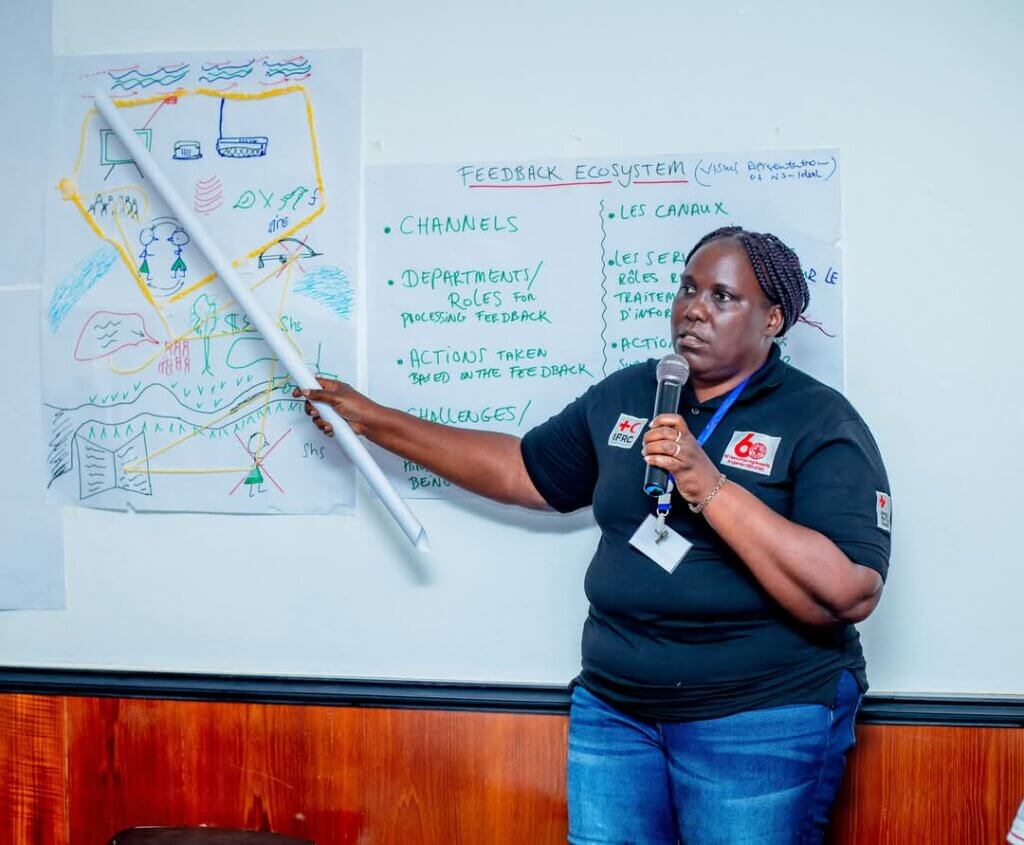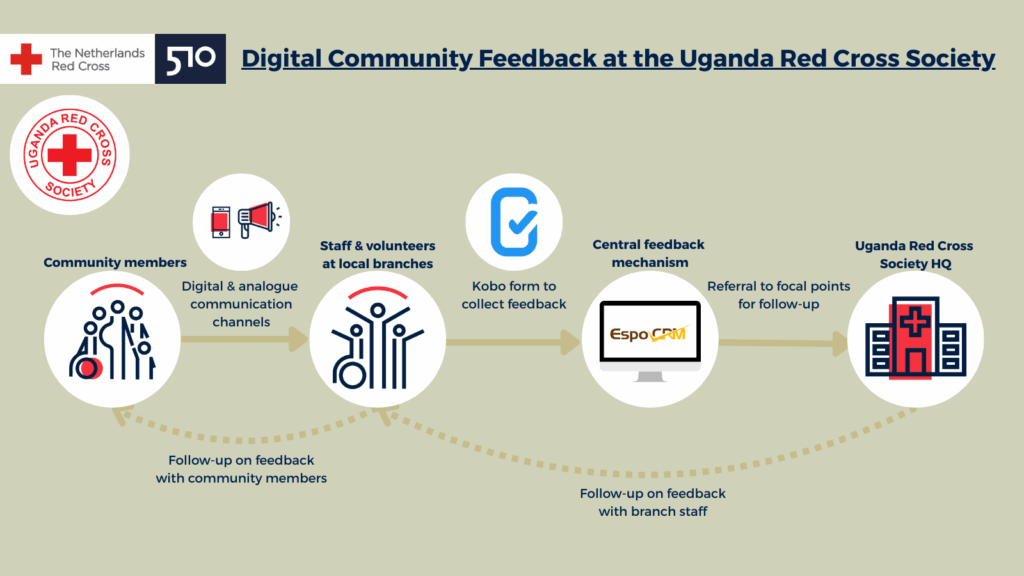With active operations in 51 branches, the Uganda Red Cross Society regularly engages communities through meetings, dialogues, home visits and social media, looking to optimize its aid offerings. However, much of this feedback was previously undocumented, making it difficult to track trends or resolve issues comprehensively. A new, centralised feedback mechanism, rooted in Community Engagement and Accountability (CEA) principles and effective data management, is helping to better capture and act on feedback through a system that is simple to navigate, flexible to adapt, and entirely hosted and maintained by the National Society itself. This initiative is funded by the Partenariat programmatique entre l'Union européenne (UE) et la Fédération internationale des sociétés de la Croix-Rouge et du Croissant-Rouge (FICR).
“We interact with communities extensively. With this new digital mechanism, we can now receive and respond to community feedback more easily, closing the feedback loop in a way that better meets our community members’ needs.”
Frances Amulen, CEA Officer at the Uganda Red Cross Society

One entry point, multiple channels
The mechanism is structured around the principle that feedback should be easy to give, regardless of how community members choose to share it. A Boîte à outils Kobo form consolidates all feedback in the same place, ensuring it is processed consistently – whether input is collected during a face-to-face conversation, a phone call or text message. The form links to open-source data management system EspoCRM, visualising community feedback data in real time. This suite of digital tools supports multiple languages and offline data collection, and will be able to integrate feedback through toll-free lines, making it accessible even in low-connectivity areas. This allows Uganda Red Cross Society teams to more effectively engage with affected populations and promote data-driven decision-making:

“By making it easy to track how feedback is received, addressed, and resolved, this mechanism provides us with an informative base to guide decision making and uphold the voices of the people we serve.”
Enock Bukenya, IT Officer at the Uganda Red Cross Society
All incoming data automatically feeds into EspoCRM, where it is categorised, tracked, and visualised. This way, National Society teams can easily see the status of each feedback entry: who is responsible for follow-up, what response is needed, and whether the issue has been resolved. EspoCRM also allows for data to be filtered by various metrics, providing a dynamic overview of trends and recurring concerns. By introducing this unified system, the Uganda Red Cross Society is moving away from siloed feedback processes. Across projects and sectors, the mechanism offers a central space where community voices can be collected, analysed, and responded to – helping to close the feedback loop.
“When communities see that their voices are heard and acted upon quickly, they are more likely to engage consistently. This builds community trust, shifting the dynamic from top-down aid delivery to collaborative problem-solving.”
Edwin Tumusiime, Digital Transformation Officer and volunteer at the Uganda Red Cross Society
From prototype to practice: putting the system to the test
The system is hosted and managed directly by the National Society, strengthening digital capacities by enabling local users to track assigned feedback entries, adjust forms and update workflows autonomously. Its success relies on strong collaboration between the National Society’s headquarters and local branches, combining strategic oversight and technical support with contextual knowledge, community relationships, and on-the-ground feedback collection. Cooperation between CEA, PMER and IT departments ensures that both technical and programmatic needs are met.

A recent pilot of the digital feedback mechanism in two local branches illustrated how effective and user-friendly it can be. In ten days, volunteers collected over 365 pieces of community feedback using the Kobo form. The process proved efficient and accessible, confirming that the system works under real conditions. All feedback is now stored in one place, ready to be reviewed and acted on. Volunteers and staff can use the system confidently, and the feedback collected is now helping refine it before its rollout across the country.
Supporting locally led action and peer learning
The design of this mechanism reflects a broader strive towards locally led action. By ensuring that the Uganda Red Cross Society can fully manage this lightweight, adaptable mechanism for feedback management, the initiative strengthens ownership and digital resilience. By putting digital tools in the hands of local teams, the system empowers branches to act on real-time insights, fostering faster responses, greater accountability, and community-driven humanitarian programming. Lessons from this implementation are already being used to support other National Societies, with rollouts planned in South Sudan, Sudan, and Zambia. As the system expands, it will continue to evolve based on user input – ensuring it remains simple, relevant, and responsive to community needs.
CLAUSE DE NON-RESPONSABILITÉ : Veuillez noter que les versions arabe, française et espagnole de cet article ont été générées automatiquement à l'aide de l'intelligence artificielle. Nous ne pouvons pas garantir l'exactitude de ces versions.
Nous voulons vous entendre !
Are you interested in pursuing a similar data management solution with your National Society or organization? Please reach out to:
Data and Information Management Coordinator: Wessel de Jong wdejong@redcross.nl
Service Coordinator, Community Engagement and Accountability: Daan Gorsse dgorsse@redcross.nl